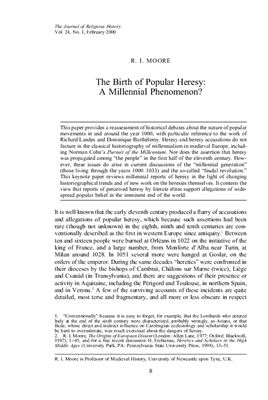The Joual of Religious History
Vol. 24, No. 1, February 2000, 18 pages
This paper provides a reassessment of historical debates about the nature of popular
movements in and around the year 1000, with particular reference to the work of
Richard Landes and Dominique Barth?lemy. Heresy and heresy accusations do not
feature in the classical historiography of millennialism in medieval Europe, including Norman Cohn’s Pursuit of the Millennium. Nor does the assertion that heresy
was propagated among the people in the ?rst half of the eleventh century. However, these issues do arise in current discussions of the millennial generation
(those living through the years 1000–1033) and the so-called feudal revolution.
This keynote paper reviews millennial reports of heresy in the light of changing
historiographical trends and of new work on the heresies themselves. It contests the
view that reports of perceived heresy by literate elites support allegations of widespread popular belief in the imminent end of the world.
Vol. 24, No. 1, February 2000, 18 pages
This paper provides a reassessment of historical debates about the nature of popular
movements in and around the year 1000, with particular reference to the work of
Richard Landes and Dominique Barth?lemy. Heresy and heresy accusations do not
feature in the classical historiography of millennialism in medieval Europe, including Norman Cohn’s Pursuit of the Millennium. Nor does the assertion that heresy
was propagated among the people in the ?rst half of the eleventh century. However, these issues do arise in current discussions of the millennial generation
(those living through the years 1000–1033) and the so-called feudal revolution.
This keynote paper reviews millennial reports of heresy in the light of changing
historiographical trends and of new work on the heresies themselves. It contests the
view that reports of perceived heresy by literate elites support allegations of widespread popular belief in the imminent end of the world.

